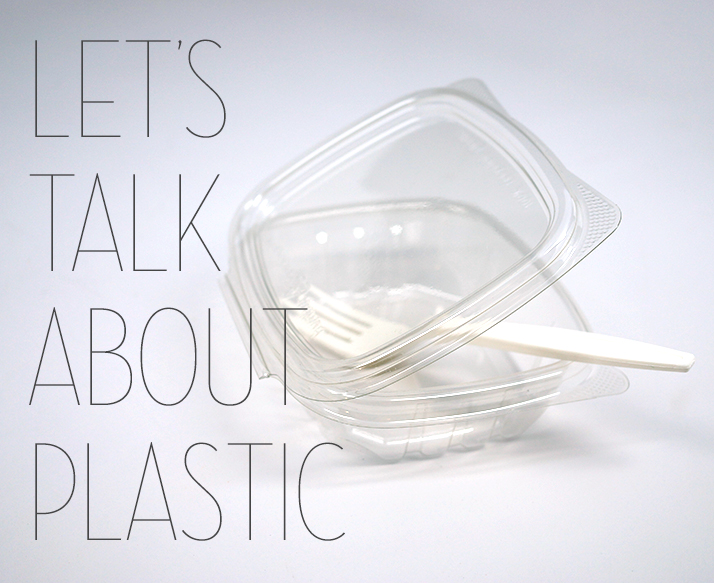Plastic is all around us. The useful material shows up in shopping bags, utensils, toys, clothes, and almost any other conceivable item found in 21st century America. The obvious utility of this ubiquitous substance sometimes obscures its shortcomings. The vast majority of plastic used in the United States is derived from petroleum. Odds are, if you’re reading this newsletter, than you already understand the litany of ecological issues associated with using a spoon of petroleum to feed yourself. At the same time, we all have to eat, and not everyone carries a cutlery set or fabric bag on their person at all times. We at the Co-op recognize the need for affordable, easily available shopping accoutrements. We also take very seriously the responsibility given to us by our owners to conduct business while impacting the Earth as little as possible.
My goal here is to reveal the thought process behind why we use the kinds of plastic we do in-store. Broadly speaking, four kinds of plastic are available for us to use in our store materials.
- 1) Petrochemical Plastics from Virgin Materials: Everyone loves fresh fruit, recently picked from the farm. And only the most devout Paleo-enthusiast would deny an affection for warm bread, newly baked from wholesome ingredients. When it comes to plastic, though, fresher isn’t better. We don’t want to contribute to the extraction of petroleum from beneath the Earth’s crust any more than we have to. Not to mention that most of these items will wind up sitting in a landfill for the next few thousand millennia.
- 2) Biodegradable Plastics: Biodegradable plastics, in theory, are an improvement on the conventional kind. Microorganisms are able to break them into smaller pieces. Unfortunately, they are still just plastic. A “biodegradable” plastic fork eventually breaks down into microscopic plastic pellets, and thus it will remain for a geological epoch or two.
- 3) Compostable Plastics: It’s plastic! It’s not made out of petroleum! It doesn’t just break down, but it can be composted! Surely it’s too good to be true, right? Right.
The compostable plastics available on the market today are almost exclusively made from GMO crops. The Co-op’s GMO policy states that “Our goal is to eventually remove products containing GMOs from the shelves of our store entirely, until nationwide labeling efforts are the standard.”. The store has made the decision to not support the GMO industry, and we are therefore not going to purchase any more compostable plastics until we know for sure that the items we purchase are GMO free.
More practically, supposedly “compostable” plastics aren’t always that easy to compost. The folks at Heartseed Farms, who currently take our compost, have recently informed us that the compostable utensils we had been using have not been breaking down. Most compostable plastic only breaks down when processed by large-scale industrial composters. So, we are holding off on compostable plastics until the technology catches up with our sustainability and non-GMO goals.
- 4) 100% Recycled Content Plastic: Recycled plastic is made entirely from petrochemicals that have already been extracted from the earth and made into something useful. While we’d rather the oil stay in the ground to begin with, we’re willing to take advantage of what has already been used. By purchasing recycled items, we support the waste reclamation industry, hopefully spurring further innovation in the field of recycling and conservation. Not to mention, items like our reusable grocery bags are manufactured by the Roplast corporation right here in Butte County, from plastics used in local agriculture. While we wish there were a better option, recycled plastic products are the best choice for us at this moment.
I hope that this has revealed a bit about why the Co-op has opted to purchase 100% recycled plastic products in many of our departments. We are always vigilant for new opportunities to improve our operations’ ecological efficiency. And you (yes, you!) are the most important part of determining how many single-use items we use. Every time you bring in your own bag (or re-use one of our Roplast bags [don’t forget to get your sticker from a cashier!]) you prevent a new bag from being manufactured. Every time you use your own utensils to eat our delicious deli offerings, you reduce the demand for plastic cutlery. You, the Co-op owners and shoppers, are the single most important part of every part of our business—you will be the ones that make the Co-op the best that it can be.


